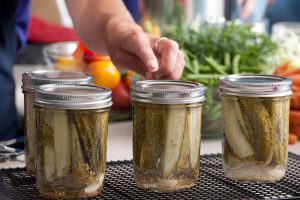Bulletin #4277, Can Home-Canned Food Spoil?
Food Safety Facts
By Mahmoud El-Begearmi, Extension professor, nutrition and food safety, University of Maine Cooperative Extension.
Revised by Jason Bolton, associate Extension professor and food safety specialist, University of Maine Cooperative Extension.
For information about UMaine Extension programs and resources, visit extension.umaine.edu.
Find more of our publications and books at extension.umaine.edu/publications/.
It is fall and you have just harvested your garden and you have decided to can the majority of your crop. Six months later you still have rows and rows of canned goods in your pantry and you have a few questions. Are they still safe to consume? Can home-canned food spoil? And how long do they last?
Yes, home-canned food can spoil, and here are some reasons why, and solutions to what you can do about them:
Reason: Fresh food was of poor quality, or unwashed, unpeeled or untrimmed. This results in a high microbial load. It may have required a longer processing time for complete sterilization than is usually recommended.
Solution: Prepare/clean food properly before canning to lower the microbial load.
Reason: Food was packed too tightly in jars. As a result, the temperature in the center of the jar did not get high enough long enough for complete sterilization of the food.
Solution: Pack food loosely. Prepare according to the USDA Guidelines, which details cutting, and then use the recommended time, pressure, and temperature.
Reason: Jars became unsterile soon after being filled. If lids are not placed on jars and processing is not started immediately after hot filling the jars, microorganisms may grow to very high levels prior to processing. Thermal processing may not fully sterilize the product or destroy any toxins that form during the growth of the microorganisms.
Solution: Fill jars as quickly as possible and use sanitized equipment.
Reason: Under-processing. This may be due to inaccurate heat-processing time or if processing was interrupted (by a power failure, pressure fluctuation, etc.).
Solution: Check to be sure you are using up-to-date processing times and watch closely to be sure processing is not interrupted. Use the following safety tips in conjunction with USDA guidelines.
Using Pressure Canner (244°F, 115°C)
- Get your pressure gauge tested every year.
- Exhaust the canner for 10 minutes with full steam flow.
- Make an adjustment for elevation when determining processing pressure and time.
Using Boiling Hot Water Bath Canner Only for High Acid Foods (Acid or Acidified Foods)
- Cover jar tops with water by one or more inches.
- Keep water at a rolling boil during processing.
- Make an adjustment for elevation when determining processing pressure and time. (Add two minutes for every 1000 feet above sea level).
Reason: Improper processing equipment utilized. Open kettle canning, microwave canning or oven canning methods should not be used in thermal can processing. These methods do not get the canned food hot enough long enough to kill microorganisms. So the food may spoil, may contain dangerous microorganisms and their toxins, or both.
Solution: Use recommended canning methods. A pressure canner for low-acid foods and a boiling water bath canner for high-acid foods.
Reason: Improper cooling of jars after processing. Jars may have been left in the canner at the end of processing time or when the gauge read “O.” As jars cool, they can potentially suck water (containing microbes or spores) back into the food. Very slow or very rapid cooling may also have interfered with formation of a seal.
Solution: Avoid temperature abuse. Remove jars from canner after processing to cool and protect from extreme temperatures. Cool at room temperature, approximately 72°F to avoid these issues.
Reason: Use of paraffin to seal jelly jars. Paraffin is no longer recommended for sealing jams, jellies or preserves. Mold, which is the most common spoiler of sweet spreads, can send “roots” down along the edge of the paraffin and produce toxic substances, called mycotoxins, in the spread.
Solution: Can jams, jellies, and preserves as you would other foods.
Reason: Improper storage.
- Home-canned foods that are exposed to temperatures over 95°F may spoil and microorganisms can grow at these high temperatures. So, if they are still present, they may grow and spoil the food, or alter the food so that other microorganisms can grow.
- Home-canned foods stored in the sunlight may get very hot inside, which allows the air in the headspace to expand, breaking open the seal and allowing microorganisms to recontaminate the food. In foods that contain fats or oil, sunlight may accelerate rancidity.
- If very acidic foods (pickled or fermented products, and some juices) were kept for a long time, the acid may have eaten away at the lid, resulting in pinholes that allowed microorganisms to get into the jar. Discard any home-canned food with damaged or flaking metal on the lid.
- Lids on home-canned foods stored in a damp place may also rust through, allowing microbes to get into the food.
Solution: Store home-canned foods in a cool, dry place. Date all home-canned goods and use within 12 months.
Information in this publication is provided purely for educational purposes. No responsibility is assumed for any problems associated with the use of products or services mentioned. No endorsement of products or companies is intended, nor is criticism of unnamed products or companies implied.
© 2000, 2011
Call 800.287.0274 (in Maine), or 207.581.3188, for information on publications and program offerings from University of Maine Cooperative Extension, or visit extension.umaine.edu.
The University of Maine is an EEO/AA employer, and does not discriminate on the grounds of race, color, religion, sex, sexual orientation, transgender status, gender expression, national origin, citizenship status, age, disability, genetic information or veteran’s status in employment, education, and all other programs and activities. The following person has been designated to handle inquiries regarding non-discrimination policies: Sarah E. Harebo, Director of Equal Opportunity, 101 North Stevens Hall, University of Maine, Orono, ME 04469-5754, 207.581.1226, TTY 711 (Maine Relay System).


